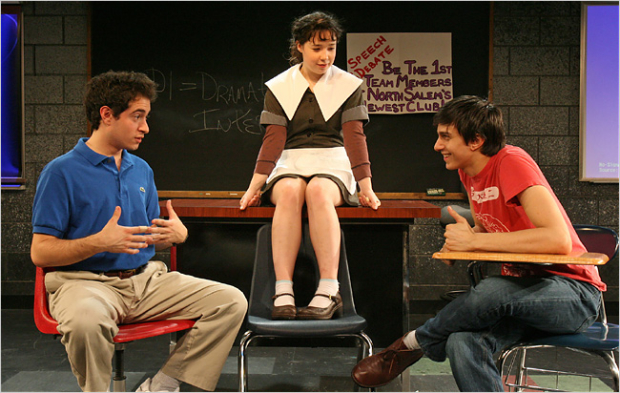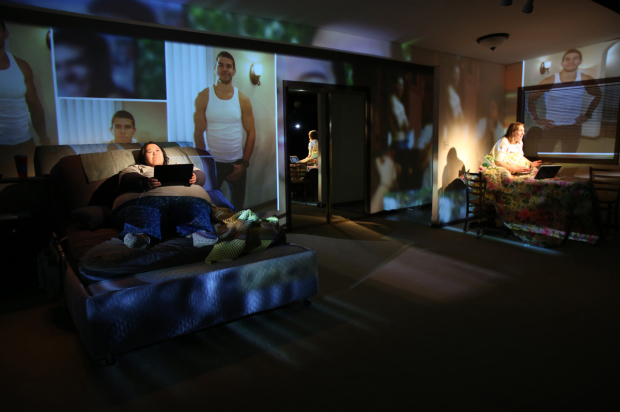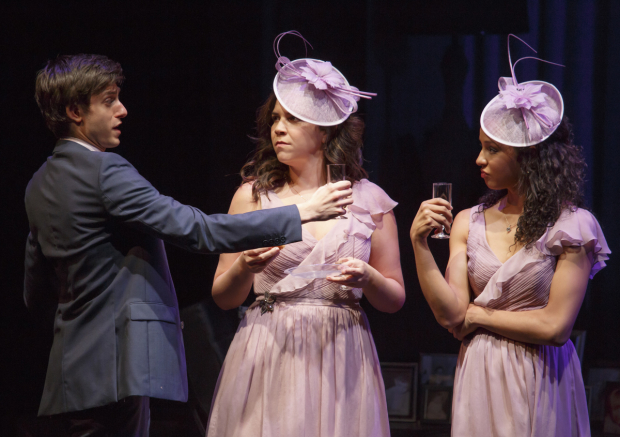Roundabout Underground: Making a Cut-Throat Industry Work for Young Playwrights
In 2005, New York City's Roundabout Theatre Company sank (literally) more than a million dollars on a tiny subterranean performance space floors beneath its currently existing off-Broadway theater. The whole endeavor was undertaken for one reason: to create the perfect home for a new play by an unknown writer.
Stephen Karam's Speech & Debate came to the attention of Roundabout's Artistic Director Todd Haimes earlier that year. And while Haimes was immediately smitten, he worried about what would happen if they staged the work in any of the organization's current, large spaces. A year prior, Haimes had seen the premiere of three new plays by young American writers (one of which was presented by Roundabout) at big NYC theaters only to be panned by critics.
"They were the kind of reviews that would make you never want to write again," said Haimes. "I'm not saying they should have gotten great reviews, but I thought they were inappropriate reviews for [writers of that] age."
Going Underground

(© Joan Marcus)
So Roundabout Underground, a program dedicated to producing the professional New York debuts of emerging writers, was born. Speech & Debate was a resounding success, launching Karam into a career that would put him on Broadway twice (with The Cherry Orchard and his Tony-winning The Humans) and making him a Pulitzer finalist for Sons of the Prophet. Since moving heaven and earth to kick-start that artist's career, Roundabout Underground has solidified its goal to find and foster the work of talented young playwrights any way they can.
The theory, said Haimes, was twofold: first, these talented writers would receive a career boost from the attention a Roundabout production would get them, and second, their work would benefit from access to Roundabout's physical and financial resources. On top of that, Haimes hypothesized that the new, small space would remind critics to review Underground works more gently than they would a fully iterated Broadway show.
"They've always found a way to make work what I need to make work," said writer Jenny Rachel Weiner of Underground's logistic support. (Her play Kingdom Come is currently being staged by the program.) "I was never told how much anything cost. It just was, 'We got you; we're gonna figure it out.' They really just want me to focus on the art, and so I feel very protected."
At the same time, Weiner reports being totally immersed in the creative life of her play, all the more so because Roundabout's advocacy frees her from having to juggle the details of producing her own work. "It's a playwright-centered program," she said, "and it really feels that way…I'm included in every conversation." Not only did Weiner pick her own director (Kip Fagan), she's also been involved with every casting decision and signed off on the show's creative team.
The Playwright's the Thing

(© Joan Marcus)
By all accounts, the supportive vibe that artists describe as pervasive in Roundabout Underground is due in large part to its small but mighty staff. Together, the team first selects plays (and by extension, playwrights) from a pool of hundreds and then, with Haimes' final approval, steadfastly ushers those pieces into existence.
Once selected to join the community, Roundabout Underground's playwrights enter into a world designed to nurture and support both their plays and themselves. It's important to the company that their young playwrights feel secure in the knowledge that they have an artistic home regardless of the success of their play. To illustrate that dedication to their artists, Underground starts by commissioning a second play for Roundabout by each playwright before even producing their first.
"I always tell young writers that I'm not trying to find a single perfect play for the Underground — I'm trying to find a voice I believe in who could become a part of Roundabout for years to come," said Associate Producer Jill Rafson.
Then, playwright and staff get down to the business of molding and improving the play, a process that is tailored to each writer and their show. According to Haimes, every single Roundabout production receives at least one reading. Many plays, however, can receive several readings and even multi-day workshops as the Roundabout staff and the play's creative team work together to create the best possible final product. Sometimes achieving that goal can even require a little tough love, as in the case of Joshua Harmon's Significant Other (Roundabout's second Harmon work, commissioned after his Bad Jews was selected for Underground, Significant Other will make its way to Broadway later this winter).
Originally, Harmon planned to call his tragicomic play about twentysomethings in New York The Franco-Prussian War. "First of all," laughed Haimes, "even if the play was about the Franco-Prussian War, you couldn't sell one ticket." So the artistic director put his foot down, initiating a gentle — but two-month-long — back and forth with the playwright. "I said, 'I'm not trying to tell you what to call it. I'm telling you what not to call it,'" Haimes went on. Finally, he remembers, the new title was submitted and he immediately signed off, "Great."
From the playwrights' perspective, perhaps the most appreciated element of Underground's selection process is its openness to any and all stories, without preference for certain aesthetics or tones. "The plays are all really different and I think that's awesome," said Weiner. "And it's not about the buzz of the play already," which means writers with no name recognition whatsoever have as much of a shot at a production as their more famous peers.
"I’m always looking for plays that put people, places, and events onstage that I haven’t seen before," Rafson said, with Weiner agreeing, "If the play strikes her as an important story with characters that need to be expressed, and a compelling story, then she's in. She reads the play, and the play is the thing."
Beginning this year and going forward, for each Roundabout Underground season, not one but two plays will be "the thing." The decision to double the program's size was made, according to Haimes, because a) "the program is too important, has affected too many people" and b) Underground has been "so phenomenally successful." "Not financially," Haimes is quick to add. "Financially it's a disaster, but it has changed the lives of every single [one of our writers] forever."
"I never thought it would be as successful as it's been. I'm a pretty half-empty kinda guy," the artistic director continued, calling Roundabout Underground five percent of the company's budget and 50 percent of its heart. "I'm not happy about a lot of things, but I'm totally happy with everything having to do with the Underground."

(© Joan Marcus)












